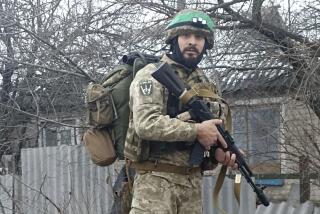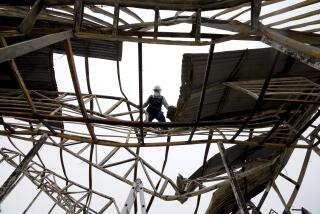Colombia Toll Climbs; Survivors Being Sought
ARMENIA, Colombia — Rescue workers struggled through driving rain and a pair of aftershocks on Tuesday as they searched a nightmare landscape for survivors of a massive earthquake that, according to unofficial figures, killed as many as 700 people and injured thousands.
As night fell more than 24 hours after Monday’s quake in western Colombia, the full extent of damage had not been assessed. Authorities feared that the death toll could exceed 1,000, as rescue workers despaired at not finding more people alive in the debris. Ambulances that once carried the injured to be airlifted transported only bodies. Campfires illuminated the area because there was no power for street lights.
Buildings alongside central Plaza Bolivar in Armenia, a city of 300,000 that was worst hit by the quake, were crushed. One heavy concrete structure collapsed upon itself, leaving all five floors the height of a single story.
It was unclear whether the two aftershocks, one registering 2.8, caused additional damage. But the plaza was evacuated on orders of Armenia’s mayor, Alvaro Patino, because weakened buildings were in danger of collapse.
One group of rescue workers wasted valuable hours digging toward the periodic sound of music. They were bitterly disappointed to find it was only a child’s toy, not a signal from a trapped survivor.
Another rescue team worked frantically Tuesday night trying to find the body of a woman who family members said had not escaped from a crumbling building.
Rescue workers used picks, shovels and their bare hands in the ruins of collapsed buildings. Some earthmoving equipment was available, but crews did not want to use it for fear of crushing possible survivors trapped under tons of rubble.
Armenia’s police station was damaged, and 17 police officers died, National Police Chief Jose Manuel Serrano said. Rescue workers said at least two firefighters died in a damaged station.
Disturbances were reported in a prison in Armenia, where 750 inmates were threatening to escape through damaged walls. Unconfirmed reports said that they had taken some guards hostage.
The Colombian Red Cross said as many as 100,000 people might have been left homeless by the quake, and those without roofs struggled Tuesday to feed themselves and find shelter from the downpour.
A legacy of poverty made the destruction worse. Decaying concrete and cinder-block buildings collapsed, but the wealthier northern section of Armenia was left largely intact.
Hundreds of families from the working-class Santander barrio gathered in a lower part of the city, their plastic and wood lean-tos barely lit by campfires.
Maria Alejandra Lopez’s five children and six grandchildren crowded into a plastic-covered area the size of a shower to escape the rain.
“I’ve never seen anything like this,” the 40-year-old grandmother said. Nearby, seven other families had built a low-slung tin-roof shelter about the size of a two-car garage. Children slept on the ground, most of them without mattresses.
“Only just now have we even eaten a little bit of broth,” said JoseAntonio Reza, a 37-year-old father of three children. He and his wife, Amparo, moved their sleeping infant and toddler from one spot to another in the makeshift shelter trying to avoid raindrops.
In the rest of the city, residents stacked furniture in front of tumbled-down houses. Broken bricks and lumber were scattered, blocking the streets.
Government officials confirmed that at least 500 people were dead, but estimates of the number killed varied widely. One local fire chief said the toll in Armenia alone could reach 2,000.
The magnitude 6.0 quake ravaged an area of Colombian coffee country spanning 20 towns and villages in five provinces. In the smaller city of Calarca, the quake killed at least 96 people, according to the Colombian Red Cross. Reports from other relief organizations indicated that at least 100 people died in nearby Pereira and other towns and villages.
In La Tabeida, villagers slept in the streets, afraid to enter the few houses left standing, propped up by wooden poles. Only one neighborhood in the town of about 5,000 people was unaffected by the quake.
Relief officials already were beginning to worry about a shortage of coffins and the danger of epidemics caused by decomposing bodies. There were reports of price-gouging for coffins.
The Colombian military was coordinating aid flights into the zone.
Medical workers on a military craft tried to doze as they shuttled from Bogota to Armenia, having worked for 30 consecutive hours without food.
“All of our transport planes are going 24 hours a day to try to get help to these people,” said Defense Minister Rodrigo Lloreda, speaking from the military airport in Bogota, the capital, where Hercules transport planes were loading up with supplies and unloading the injured they had evacuated.
Colombian First Lady Norah Puyana de Pastrana is in charge of a relief fund that had already raised more than $600,000. Assistance also arrived in the form of food, clothing, tents, medicine and portable electric generators.
Among the first embassies to respond to calls for international aid was that of Nicaragua, which offered a portion of the aid it had collected as relief for victims of Hurricane Mitch.
The Japanese Embassy offered a team of 35 earthquake experts, and the United States sent 62 Miami-Dade County firefighters from Florida.
Colombian President Andres Pastrana decided to cancel a scheduled trip to Europe, where he was to meet with World Bank officials and Pope John Paul II. Pastrana’s office contracted with a Bogota accounting firm to oversee donations and the delivery of relief aid and to prevent misuse of relief funds.
“I give my firm promise to dedicate all of the resources available, and I do mean all of the resources available, to take care of the victims of this disaster,” Pastrana said.
He announced that Colombia will receive $100 million in loans from the World Bank and that President Clinton, along with other heads of state, had called him.
Darling reported from Armenia and Lawrence from Bogota.
* ANXIETY--AND RELIEF: Colombians in Southland desperately seek news from home as the aid effort begins. B1
More to Read
Sign up for Essential California
The most important California stories and recommendations in your inbox every morning.
You may occasionally receive promotional content from the Los Angeles Times.










